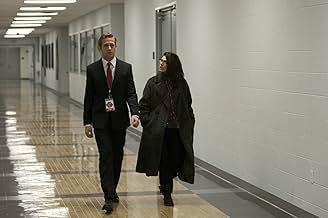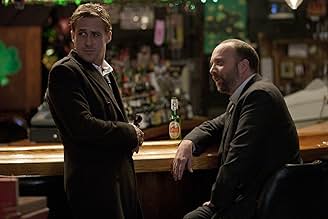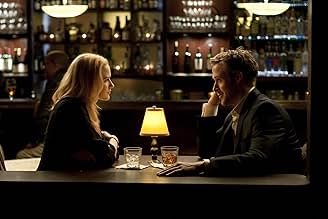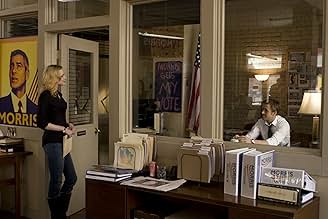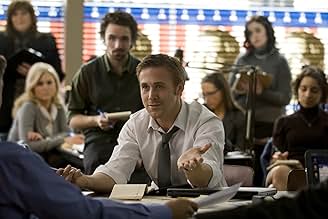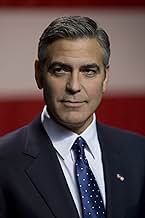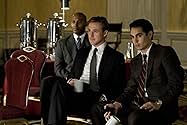Ein idealistischer Mitarbeiter für einen neuen Präsidentschaftskandidaten erhält während seines Einsatzes auf dem Wahlkampfpfad einen Crashkurs über schmutzige Politik.Ein idealistischer Mitarbeiter für einen neuen Präsidentschaftskandidaten erhält während seines Einsatzes auf dem Wahlkampfpfad einen Crashkurs über schmutzige Politik.Ein idealistischer Mitarbeiter für einen neuen Präsidentschaftskandidaten erhält während seines Einsatzes auf dem Wahlkampfpfad einen Crashkurs über schmutzige Politik.
- Für 1 Oscar nominiert
- 9 Gewinne & 36 Nominierungen insgesamt
Empfohlene Bewertungen
George Clooney is running for President. Well, I mean, in "The Ides of March," as Governor Mike Morris, he's running for the Democratic Presidential nomination. He's the good guy and his opponent is the bad guy. Because that's how it is supposed to be, right? The opponent's campaign manager is played by the ever-shady Paul Giamatti, while Morris' campaign is championed by the young, handsome idealistic Stephen (Ryan Gosling).
This is about politics, the games people play to get ahead, and the types of people who get played—that's the interesting part. The refreshing part, is that this isn't about election night and who is going to win and who is going to lose. A few poll numbers are rattled off, but it's mostly about what is going to happen to our heroes (or anti-heroes) and what are they going to do in response. When you look like Clooney and Gosling, it's hard not to be the hero, but remember, this is politics and nobody is really a hero in that mess.
People make mistakes. I enjoyed following Stephen as he struggled internally with his path forward. He believes in the good of the Governor. He's smart and passionate and makes a good campaign manager. His mistakes seem minor and understandable. The problem is, he's 30. He's at the in-between age, where he's half young-college-student-ready-to-take-over-the-world and half experienced-cynic. Those are two very combative halves and when they come at odds within him, the character takes some shocking and drastic turns.
The few references to actual political gaffes are obvious and just done for comic relief. All the clever lines are stolen by Giamatti, who, I am predicting, will come away with the only acting nomination for the film. Although, the brilliant character work – that's done by everybody, and is what makes "The Ides of March" so intriguing.
This is about politics, the games people play to get ahead, and the types of people who get played—that's the interesting part. The refreshing part, is that this isn't about election night and who is going to win and who is going to lose. A few poll numbers are rattled off, but it's mostly about what is going to happen to our heroes (or anti-heroes) and what are they going to do in response. When you look like Clooney and Gosling, it's hard not to be the hero, but remember, this is politics and nobody is really a hero in that mess.
People make mistakes. I enjoyed following Stephen as he struggled internally with his path forward. He believes in the good of the Governor. He's smart and passionate and makes a good campaign manager. His mistakes seem minor and understandable. The problem is, he's 30. He's at the in-between age, where he's half young-college-student-ready-to-take-over-the-world and half experienced-cynic. Those are two very combative halves and when they come at odds within him, the character takes some shocking and drastic turns.
The few references to actual political gaffes are obvious and just done for comic relief. All the clever lines are stolen by Giamatti, who, I am predicting, will come away with the only acting nomination for the film. Although, the brilliant character work – that's done by everybody, and is what makes "The Ides of March" so intriguing.
Corruption is such a nasty word. It is universally steeped in negative connotation, and is a term applied theoretically to a selfish, unjust misuse of power. Yet, realistically, this evil becomes hard to determine, and many attempts at justification can be made using alternate terms, such as "motivated" or "single-minded". Many of the best social dramas have explored this ambiguous area: in House of Sand and Fog (2003) an unfairly biased policeman was put to work, for once, for the supposed sympathetic protagonist, but we still didn't find it excusable; more recently, in the fiercely intense Contagion, the top doctor leaked confidential information in order to place his wife's chances of survival above the others – in this case, we can understand his position, but the injustice at hand here is still undeniable.
It is very unfortunate in society that the places where corruption is most prevalent are those in which justice and citizenship is supposed to be the absolute goal. Contagion and other similar films expose this in the medical industry, films like L.A Confidential (1997) in the police force, and now George Clooney, as both writer and director, has brought us another razor-sharp political drama that reveals how cutthroat and sinister working in the government can be, even if creating a "free world" is purportedly the overall goal.
Ryan Gosling portrays another robust yet ultimately inadequate young businessman attempting to excel in a challenging line of work. In Fracture (2007) it was the legal system, where, again, his character, Willy Beachum, faced this same temptation when his partners urged him to falsify evidence in order to put away a fiend that they knew to be guilty, yet could find no proof against. Willy resisted admirably, but Stephen Meyers, his more competent yet far less righteous character in The Ides of March, has rather weak moral resolve. He is the talented and favoured staffer of presidential candidate Governor Mike Morris (Clooney), a man whose political philosophies he genuinely supports, and is very anxious to see become president. However, Morris is a man who sticks firmly to his principles and is unwilling to make a strategic compromise. It is an insistence that frustrates Stephen, and indeed his entire team as they see guaranteed victory is within their grasp if he only concedes to endorse the slightly disagreeable Senator Thompson (although neither Jeffrey Wright nor Clooney exactly make it clear what it is that Morris dislikes about him). It is a case of breaking a few eggs to make a good cake, and as Morris continues refusing to do so, pressures mount, the opposition begins to gain the upper hand, and a highly riveting series of complications arises.
Audiences will be happy to hear that they will not have to sit through a ridiculous amount of dry, technical passages of dialogue, sift through needlessly enigmatic storytelling methods and poke and prod their way through murky themes in order to find value in the film. The broader ideas are not all it has to offer, but lie over the top of the solid story foundations to be properly examined upon the reflection that takes place after viewing, as they should. This piece also works as a slickly entertaining, enthralling crime thriller. For while the intricate world of politics can arguably be likened to a game of chess, as it is in the film, the pieces are not stone figures, they are real people whose entire lives become ruined when they are captured by the opposing side/ Seeing as beyond the point of the Senator Thompson dilemma, the plot involves a string of juicy surprises, I shouldn't really reveal much more. All I will say is that Paul Giamati, Phillip Seymour Hoffman, Evan Rachel Wood and Marisa Tomei all give exceptional performances as the key figures involved, and that each of their characters, and at one stage or another, harbours a deadly secret.
Clooney's direction is remarkably apt, particularly in a wordless scene in which Hoffman's character is given aggravating news from Morris inside his car, and we become cheeky onlookers from the outside, not even seeing their faces. He has also done well adapting beau Willimon's play Farrugat North with the help of Oscar-nominated screenplay writer Grant Henslov (Good Night, and Good Luck) and the playwright himself. His performance as Morris is fine work also, but, for the common audience at least, the film really belongs to Gosling, who proves once again that he is more than just an exceptionally handsome teen idol, but the most convincing and versatile young actor since Johnny Depp, with Max Minghella (The Social Network) and Jennifer Ehle topping things off beautifully as part of the supporting cast.
It is very unfortunate in society that the places where corruption is most prevalent are those in which justice and citizenship is supposed to be the absolute goal. Contagion and other similar films expose this in the medical industry, films like L.A Confidential (1997) in the police force, and now George Clooney, as both writer and director, has brought us another razor-sharp political drama that reveals how cutthroat and sinister working in the government can be, even if creating a "free world" is purportedly the overall goal.
Ryan Gosling portrays another robust yet ultimately inadequate young businessman attempting to excel in a challenging line of work. In Fracture (2007) it was the legal system, where, again, his character, Willy Beachum, faced this same temptation when his partners urged him to falsify evidence in order to put away a fiend that they knew to be guilty, yet could find no proof against. Willy resisted admirably, but Stephen Meyers, his more competent yet far less righteous character in The Ides of March, has rather weak moral resolve. He is the talented and favoured staffer of presidential candidate Governor Mike Morris (Clooney), a man whose political philosophies he genuinely supports, and is very anxious to see become president. However, Morris is a man who sticks firmly to his principles and is unwilling to make a strategic compromise. It is an insistence that frustrates Stephen, and indeed his entire team as they see guaranteed victory is within their grasp if he only concedes to endorse the slightly disagreeable Senator Thompson (although neither Jeffrey Wright nor Clooney exactly make it clear what it is that Morris dislikes about him). It is a case of breaking a few eggs to make a good cake, and as Morris continues refusing to do so, pressures mount, the opposition begins to gain the upper hand, and a highly riveting series of complications arises.
Audiences will be happy to hear that they will not have to sit through a ridiculous amount of dry, technical passages of dialogue, sift through needlessly enigmatic storytelling methods and poke and prod their way through murky themes in order to find value in the film. The broader ideas are not all it has to offer, but lie over the top of the solid story foundations to be properly examined upon the reflection that takes place after viewing, as they should. This piece also works as a slickly entertaining, enthralling crime thriller. For while the intricate world of politics can arguably be likened to a game of chess, as it is in the film, the pieces are not stone figures, they are real people whose entire lives become ruined when they are captured by the opposing side/ Seeing as beyond the point of the Senator Thompson dilemma, the plot involves a string of juicy surprises, I shouldn't really reveal much more. All I will say is that Paul Giamati, Phillip Seymour Hoffman, Evan Rachel Wood and Marisa Tomei all give exceptional performances as the key figures involved, and that each of their characters, and at one stage or another, harbours a deadly secret.
Clooney's direction is remarkably apt, particularly in a wordless scene in which Hoffman's character is given aggravating news from Morris inside his car, and we become cheeky onlookers from the outside, not even seeing their faces. He has also done well adapting beau Willimon's play Farrugat North with the help of Oscar-nominated screenplay writer Grant Henslov (Good Night, and Good Luck) and the playwright himself. His performance as Morris is fine work also, but, for the common audience at least, the film really belongs to Gosling, who proves once again that he is more than just an exceptionally handsome teen idol, but the most convincing and versatile young actor since Johnny Depp, with Max Minghella (The Social Network) and Jennifer Ehle topping things off beautifully as part of the supporting cast.
The Ides of March isn't a story just about the back-alley dealings of those seeking to gain power; it's a morality tale of how much one must wrestle between doing things because he feels they are the right thing to do and doing things that will serve themselves better in the long run. It is a political melodrama, but it just as easily have been written about business and high finance. It's highly cynical, with its points driven home by a terrific cast, and yet it manages not to be heavy handed or preachy. Indeed, there aren't really any strictly good or bad guys in this movie.
Ryan Gosling stars as Steven Myers, a top aide to Governor Mike Morris (George Clooney), who is running for president; currently at stake is the battleground state of Ohio. If Morris can gain Ohio's delegates, he's pretty much assured to get the Democratic nomination, and in the film it's noted that the Republicans have a weak field themselves (at best). All of this means, of course, that as Ohio goes, so goes the presidency, so there's plenty riding on this one primary.
Morris' campaign manager is Paul Zara, played by Philip Seymour Hoffman, a veteran of many cutthroat campaigns. And although Zara has the experience, Morris often turns to his young(ish) aide Steven to gain a less-jaded, more-truthful perspective. (Of course, by doing so, Morris is simply trying to hear from someone who may not be thinking four years or fewer down the road at his next job.) Like most staffers, Steven believes in Morris; he thinks that if the man is elected president, good things will happen. He is the prototypical idealistic aide; doing the right thing will win out over all, he believes. He's not completely naive to backdoor politics, but his organization, his analysis, his acumen, and his spirit are what endear Morris to him.
Even though Steven is not a Mr. Perfect, a self-righteous do-gooder, he's savvy; he knows which buttons to push. He learns, though, that his chief obstacle to success is in recognizing whom is trustworthy, and just because one is friends with another doesn't mean that either owes the other much when it comes to the game of politics. For example, simply feeding the press (in the person of Marisa Tomei) the occasional tidbit doesn't mean that the media will be an extended PR arm for Morris.
Somewhere along the line, Steven reaches a breaking point, a place at which loyalty isn't the most important thing on his plate. This point comes as a result of two pretty bad decisions, one that he knows is a bad idea right away and another that seems a little more innocent – but then Steven has underestimated how petty, parochial, and vindictive those in the business can be. It's all about one's level of paranoia. You have to have some in order to foresee problems, but too much of it will hollow out your soul in a jiffy.
Clooney, who also directed, looks and sounds presidential, but he's not the focus of the movie; as with his brilliant Good Night, and Good Luck, he's a powerful supporting character. Things don't revolve around Mike Morris as they do around Steven Myers, and that's one reason the movie works – our focus is on the morality battle, and it's presumed that as a sitting governor, that battle's long been over for Morris.
The hand-picked cast is superb. Not only do we get Clooney, Hoffman, Tomei, and Gosling, we also get Paul Giamatti as the governor's opponent's campaign manager. Each one seems to steal scenes, even ones they share. Even Evan Rachel Wood, as a new intern in Morris' camp, turns in a splendid performance.
It's clear that The Ides of March won't be for everyone. It is, as I said, cynical – highly so. It won't leave you hopeful about, well, anything. It gives you no one for whom to really cheer and yet no one for whom to really despise. It offers realism in lieu of hope, and its goal of trying to explain the motivations of those who get involved in these campaigns is reached. It's an effective, gripping melodrama.
Ryan Gosling stars as Steven Myers, a top aide to Governor Mike Morris (George Clooney), who is running for president; currently at stake is the battleground state of Ohio. If Morris can gain Ohio's delegates, he's pretty much assured to get the Democratic nomination, and in the film it's noted that the Republicans have a weak field themselves (at best). All of this means, of course, that as Ohio goes, so goes the presidency, so there's plenty riding on this one primary.
Morris' campaign manager is Paul Zara, played by Philip Seymour Hoffman, a veteran of many cutthroat campaigns. And although Zara has the experience, Morris often turns to his young(ish) aide Steven to gain a less-jaded, more-truthful perspective. (Of course, by doing so, Morris is simply trying to hear from someone who may not be thinking four years or fewer down the road at his next job.) Like most staffers, Steven believes in Morris; he thinks that if the man is elected president, good things will happen. He is the prototypical idealistic aide; doing the right thing will win out over all, he believes. He's not completely naive to backdoor politics, but his organization, his analysis, his acumen, and his spirit are what endear Morris to him.
Even though Steven is not a Mr. Perfect, a self-righteous do-gooder, he's savvy; he knows which buttons to push. He learns, though, that his chief obstacle to success is in recognizing whom is trustworthy, and just because one is friends with another doesn't mean that either owes the other much when it comes to the game of politics. For example, simply feeding the press (in the person of Marisa Tomei) the occasional tidbit doesn't mean that the media will be an extended PR arm for Morris.
Somewhere along the line, Steven reaches a breaking point, a place at which loyalty isn't the most important thing on his plate. This point comes as a result of two pretty bad decisions, one that he knows is a bad idea right away and another that seems a little more innocent – but then Steven has underestimated how petty, parochial, and vindictive those in the business can be. It's all about one's level of paranoia. You have to have some in order to foresee problems, but too much of it will hollow out your soul in a jiffy.
Clooney, who also directed, looks and sounds presidential, but he's not the focus of the movie; as with his brilliant Good Night, and Good Luck, he's a powerful supporting character. Things don't revolve around Mike Morris as they do around Steven Myers, and that's one reason the movie works – our focus is on the morality battle, and it's presumed that as a sitting governor, that battle's long been over for Morris.
The hand-picked cast is superb. Not only do we get Clooney, Hoffman, Tomei, and Gosling, we also get Paul Giamatti as the governor's opponent's campaign manager. Each one seems to steal scenes, even ones they share. Even Evan Rachel Wood, as a new intern in Morris' camp, turns in a splendid performance.
It's clear that The Ides of March won't be for everyone. It is, as I said, cynical – highly so. It won't leave you hopeful about, well, anything. It gives you no one for whom to really cheer and yet no one for whom to really despise. It offers realism in lieu of hope, and its goal of trying to explain the motivations of those who get involved in these campaigns is reached. It's an effective, gripping melodrama.
You came here from the trailers and the clever poster campaign? Or maybe you came here because you love Clooney and the idea of him doing a political film appeals to you because you agree with much of what he puts his name behind? Or maybe you just decided to watch on a whim? Well for me it was the first two that put it in my mind but the third that saw me pick this from the queue recently. The publicity leave you in little doubt that this is a smart political movie while the names involved all point to something that is worth your time, expensive and very professionally put together. In terms of these latter qualities the film does deliver but it is just a shame that it is not as good as it looks in regards the former.
Let's deal with the superficial first. The film looks great and Clooney deserves credit for the job he has done here as it has a real sheen to it with really well designed shots and a real richness to the look (credit to the cinematographer of course). On top of this the score is just right – a little generic in its tone perhaps but it works and fits the film well. Naturally the cast features a collection of names and faces for whom quality is the norm and generally the film looks and feels like it is a really good product. The only place where it falls down is that it isn't quite as smart as it thinks it is. The story is fairly straightforward and the "message" (if that is the word) is equally simple; this puts a lot of pressure on the lead character of Meyers to be engaging and thrilling in his journey into the murky compromises and twists of politics – and this is the problem, it doesn't come over that way.
The solid plot holds the attention and the sleek presentation feels like velvet throughout but the real meat of the story here needs to come through Meyers and sadly the material just doesn't make this happen. In terms of narrative he has it, but in terms of heart and soul of the man, it is lacking and as a result the film is lacking. It shows in Gosling's performance; he is a good presence, easy to look at and follow but he doesn't have enough within him to lift the film. I watched A Single Man the other day, in which Colin Firth delivered a great and nuanced performance that carried that entire film – this needed Gosling to do that, but he didn't and/or couldn't with what he was given. Clooney is good in an easier role as are Hoffman, Giamatti, Tomei, Wright and others but they are the dressing around Gosling's character and as good as they look, they cannot hide the fact that the centrepiece just isn't as good as the trimmings suggest.
It isn't a bad film, indeed I quite enjoyed it as it went along, but it is a lot less satisfying than it looks like it will be. Really professional and polished but the heart of the message doesn't come out and the central character doesn't deliver as they should. Solid, but neither as sharp or as smart as it thinks it is or as it should have been.
Let's deal with the superficial first. The film looks great and Clooney deserves credit for the job he has done here as it has a real sheen to it with really well designed shots and a real richness to the look (credit to the cinematographer of course). On top of this the score is just right – a little generic in its tone perhaps but it works and fits the film well. Naturally the cast features a collection of names and faces for whom quality is the norm and generally the film looks and feels like it is a really good product. The only place where it falls down is that it isn't quite as smart as it thinks it is. The story is fairly straightforward and the "message" (if that is the word) is equally simple; this puts a lot of pressure on the lead character of Meyers to be engaging and thrilling in his journey into the murky compromises and twists of politics – and this is the problem, it doesn't come over that way.
The solid plot holds the attention and the sleek presentation feels like velvet throughout but the real meat of the story here needs to come through Meyers and sadly the material just doesn't make this happen. In terms of narrative he has it, but in terms of heart and soul of the man, it is lacking and as a result the film is lacking. It shows in Gosling's performance; he is a good presence, easy to look at and follow but he doesn't have enough within him to lift the film. I watched A Single Man the other day, in which Colin Firth delivered a great and nuanced performance that carried that entire film – this needed Gosling to do that, but he didn't and/or couldn't with what he was given. Clooney is good in an easier role as are Hoffman, Giamatti, Tomei, Wright and others but they are the dressing around Gosling's character and as good as they look, they cannot hide the fact that the centrepiece just isn't as good as the trimmings suggest.
It isn't a bad film, indeed I quite enjoyed it as it went along, but it is a lot less satisfying than it looks like it will be. Really professional and polished but the heart of the message doesn't come out and the central character doesn't deliver as they should. Solid, but neither as sharp or as smart as it thinks it is or as it should have been.
George Clooney's 'Ides of March' could have been set in a corporation. Or a university. A family. But in fact it is set during a Presidential Campaign. Specifically a Democratic Primary in the state of Ohio. We've got two candidates. Each candidate has a staff. And more than the candidates, it's the politics between the staff members that forms the foundation of this story.
"I know something about you, so you'd better ... ' 'Ah, but I know something about YOU, so if you know what's good for you ... ' 'But what about the time that you ... ' 'Never mind me, what about you ... '
And so on. And so on. But most important, it works. It is compelling. The stakes get added to as the film progresses until the determination of the winning candidate will depend on nothing more than this back and forth of power.
I liked 'Ides of March'. A lot. I thought that Philip Seymour Hoffman and Paul Giamatti were perfect as opposing campaign managers; each more unlikeable than the other. Ryan Gosling as a younger campaign official is fine (though I think that the role was not as demanding as others). As one candidate, director George Clooney is at his handsome, well-spoken, best. If there is a weak-link, it's Evan Rachel Wood as a campaign intern with more on her mind than election strategies.
Though ten years old, the film and its story, its conflicts, its undercurrent of grime, it all seemed wholly relevant today. I recommend that you see it.
"I know something about you, so you'd better ... ' 'Ah, but I know something about YOU, so if you know what's good for you ... ' 'But what about the time that you ... ' 'Never mind me, what about you ... '
And so on. And so on. But most important, it works. It is compelling. The stakes get added to as the film progresses until the determination of the winning candidate will depend on nothing more than this back and forth of power.
I liked 'Ides of March'. A lot. I thought that Philip Seymour Hoffman and Paul Giamatti were perfect as opposing campaign managers; each more unlikeable than the other. Ryan Gosling as a younger campaign official is fine (though I think that the role was not as demanding as others). As one candidate, director George Clooney is at his handsome, well-spoken, best. If there is a weak-link, it's Evan Rachel Wood as a campaign intern with more on her mind than election strategies.
Though ten years old, the film and its story, its conflicts, its undercurrent of grime, it all seemed wholly relevant today. I recommend that you see it.
Wusstest du schon
- WissenswertesStephen Meyers (Ryan Gosling) says about a slur on his opponent, "I don't care if it's true. I just want to hear him denying it." This is a reference to a statement attributed to Lyndon B. Johnson, who allegedly referred to an opponent as having carnal knowledge of farm animals. When an aide said he couldn't say that because it wasn't true, Johnson replied, "I know but I just want to hear him deny it."
- PatzerStephen asks for campaign petty cash to pay for the abortion, and then adds some of his personal funds and gives the money to Molly. It makes no sense for someone as savvy as Stephen to use campaign petty cash in this situation. He would have been making six figures and could certainly afford to use only his money. He wouldn't use campaign funds and risk leaving a trail.
- Zitate
Stephen Meyers: If you want to be president, you can start a war, you can lie, you can cheat, you can bankrupt the country, but you can't fuck the interns. They'll get you for that.
- Alternative VersionenDespite the fact that much of the movie was filmed in Ohio, the credits of the theatrical release only say "Filmed on location in Michigan". This was corrected for the home video releases, which read "Filmed in the state of Michigan and the state of Ohio".
- VerbindungenFeatured in Breakfast: Folge vom 1. September 2011 (2011)
- SoundtracksWe'll Meet Again
Written by Ross Parker and Hugh Charles (as Charles Hughes)
Performed by Robert Mervak
Top-Auswahl
Melde dich zum Bewerten an und greife auf die Watchlist für personalisierte Empfehlungen zu.
Details
- Erscheinungsdatum
- Herkunftsland
- Offizielle Standorte
- Sprache
- Auch bekannt als
- Die Iden des März
- Drehorte
- Produktionsfirmen
- Weitere beteiligte Unternehmen bei IMDbPro anzeigen
Box Office
- Budget
- 12.500.000 $ (geschätzt)
- Bruttoertrag in den USA und Kanada
- 40.962.534 $
- Eröffnungswochenende in den USA und in Kanada
- 10.470.143 $
- 9. Okt. 2011
- Weltweiter Bruttoertrag
- 76.338.111 $
- Laufzeit1 Stunde 41 Minuten
- Farbe
- Sound-Mix
- Seitenverhältnis
- 2.39 : 1
Zu dieser Seite beitragen
Bearbeitung vorschlagen oder fehlenden Inhalt hinzufügen







